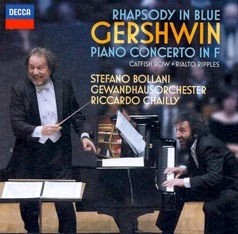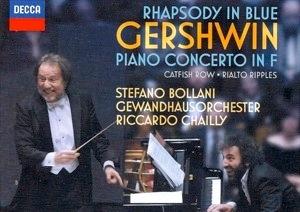
Here’s a coupling destined to pique your curiosity, if not raise your eyebrows: two Italians joining forces with Germany’s oldest symphony orchestra to perform Gershwin’s Rhapsody in Blue. It would be one thing if the music were the fully scored orchestral version that we’re most familiar with. But this is the original jazz band orchestration that American-born Ferde Grofé prepared for the Paul Whiteman Orchestra in 1924. Created in less than a month, as Gershwin handed Grofé his original two-piano composition literally as he wrote it, page-by-page, it’s a raucous romp for 24 musicians that thrives on improvisation. With instructions such as “wa-wa-effect with mute” for the brass and “let strings snap” for the banjo and bass, it’s also as New York all-American as it gets.
Well, you may say, if you can buy kosher pizza on the Lower East Side, why not chew on all-American jazz from two Milanese and the venerable German orchestra that Mendelssohn directed? After all, the language of jazz is universal. Besides, who’s more all-American than Al Capone?
Listen To The Music
Gershwin: SummertimeGershwin: Rialto Ripples (Rag)
Related Article
George Gershwin
Composer Biography
The results are quite compelling. In a beautifully performed version that continually contrasts seemingly unstoppable propulsion with subtle, laid-back lingering, jazz pianist Stefano Bollani and ex-drummer Riccardo Chailly prove they’re hardly foreign to an arrangement created for ex-San Francisco Symphony violinist Whiteman.
There are many superb moments, from clarinetist Thomas Ziesch’s authentically bluesy upward slide at the start of the Rhapsody to Bollani’s startingly fast, multi-octave upward glissando at 9:58 that just as suddenly settles into softer playing. Amidst all the momentum, there are very different places where Bollani’s summons forth images of a pianist in a smoky nightclub, lowering the volume to deliver a surprisingly intimate love song to a cooing couple in the far corner.
It’s all so wonderful that you might be easily seduced into believing this is what Gershwin, Grofé, and Whiteman intended you to hear. But turn to Harmonia Mundi’s 2010 release of the same orchestration, performed by pianist Lincoln Mayorga and Steven Richman’s Harmonie Ensemble/New York, and you encounter a whole different animal. Playing 43 seconds faster, which counts for a lot when a piece is only 16 or so minutes in duration, these forces proclaim the brash spirit of a city in which taxi horns once ruled the day.
Mayorga and Richman’s version ditches subtlety for pizzazz. It’s also even freer in its improvisational delights. Right off the bat, 93-year-old alto-saxophone, clarinet, and bass-clarinet player Al Gallodoro, a soloist with the Whiteman Orchestra from 1936 to 1965, upstages Ziesch by giving us what Whiteman and Gershwin most likely expected to hear. The percussion is louder, the playing more raucous. Reflection and subtlety fall by the wayside; the musicians are having too much damn fun racing from downtown to uptown and back.
The remainder of the American CD is devoted to the I Got Rhythm Variations for Piano and Orchestra and a host of original, ever-popular song arrangements for orchestra. We've included a higher quality mp3 clip of Mayorga and the Harmonie Ensemble New York performing Summertime.
The remainder of the European CD is devoted to the irresistible "Catfish Row" Symphonic Suite, the Concerto in F for Piano and Orchestra, and the youthful "Rialto Ripples." Bollani and Chailly have lots of fun with the latter, even throwing in some verbal patter about cutting out for linguini. The music from Porgy & Bess is a joy, with fabulous whirling in the “Hurricane” section and lots of brash brass. But something goes awry with the Concerto in F, which failed to hold my interest despite repeated attempts to give it a fair shake.
If ordered to rate this Rhapsody as on American Idol or whatever the show is, I’d say 5 stars for chutzpah and 3.5 for execution. But I’d also say, don’t miss the better-recorded, far more authentic Harmonia Mundi version. It’s got the Rhapsody that never sleeps.

